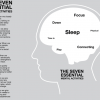
My wonderful 50 day experience with Therapeutic doses of Methamphetamine (Desoxyn) - Healed my mind
#1
Posted 19 June 2014 - 02:49 AM
#2
Posted 19 June 2014 - 06:14 AM
RahMaz, congratulations on the excellent post, it is very well written. Welcome to Longecity! Please post more often, you'd be an asset to the site given your background in neuroscience.
This medication is seldom prescribed and feared out of ignorance. The truth is that this is a benign substance in low dosages in comparison to amphetamine. Mixed amphetamine salts, and D-amphetamine, both cause PNS stimulation such as elevated BP and heart rate. D-methamphetamine is primarily CNS stimulation, and has very little PNS stimulation. I cannot find the study at the moment but most addicts are not able to discriminate between amphetamine and methamphetamine in blind tests.
On the basis of mitigating cardiotoxicity alone, this should be used in favor of Adderall (mixed amphetamine salts) for the treatment of ADHD, narcolepsy and other chronic conditions.
I'm certainly not advocating this as a "nootropic" to anyone. Amphetamine neurotoxicity should be common knowledge on this forum, especially in 2014. D-Methamphetamine is typically regarded to be much more neurotoxic due to it's affinity for serotonergic neurons/transmitters (and other reasons to). This being said, what was your rationale for wanting to use D-methamphetamine (Desoxyn) over D-amphetamine or its prodrug? Your explanation to your doctor was that it lacked duration but surely you could redose. Since you have a background in neuroscience, I'm certain you had other reasons and I would like very much to hear these.
I have essentially "up regulated" my neuronal circuits.
Literally though, have you not downregulated your neuronal circuits as methamphetamine's action on dopaminergic neruons as a dopamine-releasing-agent, would cause less dopamine to be naturally produced and therefore result in a net decrease of dopamine receptor density?
I'm certain you have seen the paper below, low dosages, of methamphetamine being neuroprotective.
Low dose methamphetamine mediates neuroprotection through a PI3K-AKT pathway.
RahMaz, did you take anything that is neuroprotective such as antioxidants to mitigate the potential neurotoxicity?
#3
Posted 19 June 2014 - 07:52 AM
Dexedrine (d-amphetamine) is actually very commonly prescribed, almost as much as adderall. The big difference between dextroamphetamine and methamphetamine is that methamphetamine lasts a little bit longer and has a slightly higher affinity.
I was not taking any other supplements, or antioxidants, other than the occasional cup of tea. I actually stopped taking all of my other vitamins, in order to avoid any biochemical conflicts, and to fully ascertain the the effects were caused by the Desoxyn and not by something else I was taking.
Amphetamine neurotoxicity is highly misconstrued. While it is a very real thing, my research (no formal tests, just looking at other studies) has lead me to believe strongly that amphetamine is no more neurotoxic than apples are deadly. This may sound like a bold statement, but to clarify... Amphetamines are just far easier to abuse, in comparison to over-eating of an apple to kill oneself. I don't think just because something is easy to abuse that is should be considered neurotoxic. You abuse anything and you will have a relatively negative experience with potentially lasting consequences. LSD is a great psychotherapeutic and spiritual drug, but if you look at it only in the light of super-dosing(100-1000mg doses), then it is a very psychologically damaging drug that can cause irreversible psychological damage and torment. The key here is that people don't generally enjoy such high doses of LSD, where as Amphetamines are easily abused because their effect on the brain just keeps increasing.
The reason I brought up the point of duration is because I did not want to redose. While methamphetamine does have a relatively long (10-11 hr) half life in the human body, in comparison to amphetamines (4-5 hour), I rationalized that this longer half life means the bodies elimination of it is smoother. Why does this matter you might ask? If taken in moderate doses, the body is given more time, and a more smooth ability to maintain homeostasis, whereas the comedown from amphetamine is much more abrupt. Redosing would effectively disrupt that smoothness. This is just my theory, though. I figured if I was going to go with one why not go with the stronger acting one.
I don't look at chemicals and substances as magical things. I look at them as mechanical objects in a way, with a specific function, and purpose. I believe it is 100% ignorant to label a chemical with inherently good or bad connotations. They're just altering brain behavior, to what extent, and whether that extent is bad or good, depends entirely on dose. LSD, Low dose: Nootropic/Antidepressant, High dose: psychedelic/insanity. Strychnine, Low dose: Nootropic/Psychedelic, High dose: Deadly toxin. Certain Puffer Fish Toxins, Low dose, Nootropic/AMPA stimulant, High dose: Neurotoxin/paralysis agent.
I could go on. While, there are certain chemicals that have very negative effects far before the positive ones, many of the above chemicals do not meet this criteria, along with many unmentioned ones. The immaturity and abusive drug culture has made it incredibly difficult for extremely effective compounds to be seen as what they are, when used correctly. Modern Science has been persistently trying to come up with new compounds that cannot be abused, yet, at the same time, these compounds have very indirect effects, often hardly noticeable at all, granted, not all of them. There are plenty of compounds with very negative stigma that if used very carefully and properly can have tremendous medical value, sadly enough though, the majority of humans are not careful about this sort of thing. Most people just want to get high. Ironically its the compounds that bring some of the best highs and the worst addictions that have tremendously high medical potential.
This isn't just drugs though, but anything of great power. Humans are just naturally immature and primitive, though, as to not turn this into a philosophical discussion about why humans are simply hairless primitive apes that can stand upright and have low to moderate intellectual capacity, I will leave this for a another discussion.
Literally though, have you not downregulated your neuronal circuits as methamphetamine's action on dopaminergic neruons as a dopamine-releasing-agent, would cause less dopamine to be naturally produced and therefore result in a net decrease of dopamine receptor density?
That is a good point, but I explained it in my first post (fourth to last paragraph).
The ideas of downregulation or upregulation of specific receptors is extremely misunderstood by most people. I've browsed these forums here and I've noticed many people throw these terms around haphazardly. It's as if just because they so happen to learn about these mechanisms, then they miraculously know the implications of them. Upregulation, downregulation, of dopamine, dopamine receptors, is all entirely irrelevent, or rather it is all entirely relative. The brain is always trying to reach homeostasis with regard to the state that it is actively trying to maintain. The key thing to remember is that the brain is not simple like this. It is managed by thousands of chemicals. The upregulation and downregulation of one of those means very little in the grand homeostasis of the brain... but if a chemical exhausts the brain so much that those thousands of chemicals are greatly reduced, then that's when the real damage happens. This is most easily explained with the following example (below 4 paragraphs; green = moderate dose, red = abuse dose):
Say I am feeling down, low on energy, etc, and I am trying to do some math problems. For whatever reason my energy is low and my brain is not performing at its peak. I take a stimulant (such as amphetamine), and the activation of my dopamine receptors begins to increase. I have more energy, new ideas are forming, etc. I am doing my math problems and because of the excess dopamine the circuits are being hyper activated, and as well, new connections are being made at a much more dramatic rate than when I was low on "energy". Inevitably, during this time on this substance, my brain is trying to regain homeostasis, so my dopamine receptors begin decreasing in density/concentration. BUT...! Don't forget, the brain does not have a mechanism to unwire newly forming neurons. As long as those newly forming neurons are kept in use, then they will keep growing stronger. Not only this, because the amphetamine was hyper activating the circuits, their connections have become more reliable.
So fast forward a few hours... the concentration of the receptors is low, and the amphetamine is leaving my body. The receptor concentration is low, and the dopamine release is lower than when I started, but, we remember now that I did not take the amphetamine in excess! By taking it in moderation, and not getting "high", my brain has much greater reserves to reattain homeostasis, which part of that includes bring dopamine levels back up to their optimum point. Since the brain also has a higher level of reserves to use to reattain homeostasis, it also has reserves available to restabilize those newly formed neurons, assuming I don't entirely stop using them.
Now, lets also look at the flip side. Imagine I took a highly abusive dose of the amphetamine. I get super high, my brain is super activated, and I get even greater ideas than if I had taken a moderate dose! Excellent! Not. All is good during the high phase. There is no actual brain damage being caused at this point. In fact, it is during the high-phase of methamphetamine and amphetamine abuse that the most neurons are being FORMED. This is why the drug is so addictive. The circuits associated with pleasure are being highly stimulated and reinforced.
Fast forward several hours... the drug is leaving my system, dopamine release is highly decreased, and receptors are severely down regulating. The brain is constantly trying to reattain homeostasis... but wait... it's out of fuel! Not only is it lacking energy, but numerous important biochemicals have been depleted to a great extent. The neurons are excessively exhausted, and there is no fuel to repair them! What happens? Some connections will begin to fall away. With few resources to repair them, and even less dopamine to stimulate them, the chance of losing them is extremely high. Not only is all this happening, but the higher you go, the lower you fall, and the lower you fall, the longer it takes to get back up! So, with this reasoning, it could be said that the amount of neurons damaged by abusing such a drug is exponentially correlated to the level of the high the person reaches. Not only this, but the level of the high a person reaches can also be deeply connected to how powerful the craving will be to reattain that high. You know what that is? A double edged sword. I'm also not the first person to reason this last bit, actually. It is well known and researched that addiction and addictive behavior in general is directly correlated with excessive plasticity in the reward centers of the brain.
So you see, there is no sorcery going on here. The brain is a very fascinating creature. By understanding its mechanisms, and the mechanisms of the drugs that effect it, we can have the two and two working together advantageous to achieve some overall increase.
There will never ever be any cognitive advantage a person can really gain long term by upregulating a specific receptor, or transmitter, because its counterpart will just do the opposite! Cognitive gains are not gained like this. Cognitive gains are had by the strengthening and expanding of neural circuits. Effort must be exerted! The great majority of chemicals just modulate what is going on, and in most peoples minds, their brain is not rapidly putting forth an effort to expand to higher levels of intelligence. They think they will magically form the brain circuits that Einstein had just by taking a bunch of substances that make their brain function better. Now.....(not available to the public) there are substances out there that make the brain so incredibly efficient that it would seem as if they are gaining intelligence, but those still require effort! Look at the limitless movie for instance. His first day on the drug, he mostly cleaned and wasted his time. It didn't make him intelligent, it just made his mind super efficient. He didn't start gaining any cognitive skills until he started applying himself.
A perfect yet ironic example is the case of steroids. I can take a bunch of steroids, and sure, my muscles will naturally start functioning better, but I will not magically gain the body of a body builder? My muscles might coordinate better and have more fuel for repairing themselves, but if I'm not doing any exercise then they shape and form of them isn't going to increase very much at all! Every body builder knows this.
As advanced as neuroscience appears to be, the field is extremely primitive and underdeveloped, as are most modern scientific fields, in comparison to what they could be. We are just in this age where we can put fancy and futuristic designs around things to help us pretend that they are more advanced than they are. Anyone who denies this fact is blind. In the grand scheme of things, our science and technology is extremely primitive, still. The world is waiting for new minds to come and discover things!... and trust me, there is SO much left to be discovered.
#4
Posted 19 June 2014 - 12:57 PM
#5
Posted 19 June 2014 - 05:52 PM
Interesting new perspective!
Have you got a source for the correlation between 'high' and neurotoxicity that isn't explained better by the more obvious correlation between dose and neurotoxicity? I respect your quest for self-improvement, but you do come off a little bitter about enjoyable sensations. Ejaculation isn't ordinary dopaminergic/opioid stimulation; it comes with an exhausting prolactin peak that keeps dopamine low for days by (evolutionary) 'design'. Sex and life both are definitely better without it, but baby's and bathwater and such.
Edited by Raza, 19 June 2014 - 05:53 PM.
#6
Posted 19 June 2014 - 08:36 PM
Interesting. What is your opinion on modafinil?
I don't have too much of an opinion until I get the chance to try it.
Interesting new perspective!
Have you got a source for the correlation between 'high' and neurotoxicity that isn't explained better by the more obvious correlation between dose and neurotoxicity? I respect your quest for self-improvement, but you do come off a little bitter about enjoyable sensations. Ejaculation isn't ordinary dopaminergic/opioid stimulation; it comes with an exhausting prolactin peak that keeps dopamine low for days by (evolutionary) 'design'. Sex and life both are definitely better without it, but baby's and bathwater and such.
I'm not sure I understand your first sentence. Neurotoxicity simply put is the destruction of neurons. Amphetamines do not give any signal for the neurons to begin apoptosis and degradation. On the contrary, the higher the degree of stimulation, the more signals that get sent to the synapses telling them to "grow". The actual neurotoxic effect in which neurons begin to die is brought about in the aftermath.
If you are a body builder and you exhaust your muscles to the greatest extent that you can, and then you neglect to fuel your body, then you will surely lose muscle. When you are working out, you are not really losing muscle, but those muscles are becoming damaged. The body does not actually do away with the muscle until it realizes it doesn't have the resources to maintain it. This is not always caused by cellular intent. If cells do not have adequate fuel when they are trying to repair themselves, then cellular process will ramp down. When a cell begins to shut down, so declines the various production of all the needed enzymes and organocellular structures for hasty repair. When these enter severe decline, any outside attempt to communicate with the cell to initiate cellular repair will face great difficulty getting its communication through. Things essentially become "bad" when the rate at which a cell shuts down begins to exceed the rate at which outside communications and fuels telling the cell to "heal" are getting through. This latter process is of course positively correlated with the amount of fuel and resources available in the body/nearby cells.
Like wise, if you were to starve yourself and not take any stimulants, your body would slowly witness the death of many cells throughout the entire body.
Amphetamines are said to be neurotoxic because they really stimulate the body. In excessive doses, it doesn't matter how much food you eat to refuel, because the rest of the processes in your body that digest the food to deliver the fuel are not as sped up as the neurological demand between it. This basically means there is a single [dosage] point which the neuroprotective properties of amphetamines end and the neurotoxic properties begin, and this of course will vary just slightly person to person depending on their overall metabolisms.
In very mild doses there is virtually no neurotoxic effects what so ever, unless of course you entirely neglect to eat, simply because the body is able to keep up with the brains demand for resources. As soon as neuronal wear&tear and the brains resource demands exceed the bodies ability to supply them, that is where neurotoxicity begins to ramp up.
#7
Posted 19 June 2014 - 09:40 PM
That's interesting, and makes a lot of sense to me! So working out your motivation circuits with a dose just low enough to cause long term potentiation but not high enough to deplete resources and cause wear and tear will result in lasting gains in those connections. Supplementing to optimize neurotrophins to foster growth and counteract any apoptosis signals, and consuming steady, easy brain energy would help too, then?
Although, we're talking primarily about dopaminergic projections here, right? Does long term potentiation work the same way, there? A large part of LTP in glutamatergic synapses is installation of additional AMPA receptors to enhance sensitivity, but I've always heard that dopamine receptors downregulate with heavy stimulation.
Anyway, that wasn't exactly the answer I was asking for. Here:
There is plenty of evidence that suggest amphetamines used properly and in therapeutic doses cause absolutely no neurotoxicity. The degree of neurotoxicity experience can actually be relatively measured by the degree of the high in comparison to the normal baseline state! If you don't come up, you don't go down!
You say that amphetamine neurotoxicity correlates specifically with the affective high experienced. I was hoping for a source or explanation of that.
Edited by Raza, 19 June 2014 - 09:44 PM.
#8
Posted 19 June 2014 - 09:45 PM
Excellent post RahMaz.
I had quite a similar experience with amphetamines and meditation in the past but I didn't keep it up for more than a day or two.
#9
Posted 19 June 2014 - 10:31 PM
That's interesting, and makes a lot of sense to me! So working out your motivation circuits with a dose just low enough to cause long term potentiation but not high enough to deplete resources and cause wear and tear will result in lasting gains in those connections. Supplementing to optimize neurotrophins to foster growth and counteract any apoptosis signals, and consuming steady, easy brain energy would help too, then?
Although, we're talking primarily about dopaminergic projections here, right? Does long term potentiation work the same way, there? A large part of LTP in glutamatergic synapses is installation of additional AMPA receptors to enhance sensitivity, but I've always heard that dopamine receptors downregulate with heavy stimulation.
You say that amphetamine neurotoxicity correlates specifically with the affective high experienced. I was hoping for a source or explanation of that.
An even worse problem is that many people get their facts about certain supplements from supplement-sales websites that type up sales articles filled with extremely large claims in order to sell some product, but this is an entirely different topic, and rant about the deceptive supplement industry.
Edited by RahMaz, 19 June 2014 - 10:32 PM.
#10
Posted 20 June 2014 - 12:01 AM
Interesting. What is your opinion on modafinil?
I don't have too much of an opinion until I get the chance to try it.
Ok. I am surprised you did not try it, it is easier to get from doctors than amphetamines.
#11
Posted 20 June 2014 - 07:12 AM
Wow thanks for sharing all this. I find it a really insightful perspective, as I understand so much of what I read on here can be conjecture, and I've come to understand the same still applies even in the professional world (based on my experience with psychiatry).
When I was being treated for schizophrenia, the shift in perception I went through was so radical, in a way I felt rather empty and disconnected from the world for a while, while my old beliefs and values vanished and I started to form new ones. I actually came to my psychiatrist with very similar research to what you are talking about in this thread, essentially that amphetamine can induce LTP and inherently assist in schizophrenia negative/cognitive symptoms. My pdoc was nice enough to prescribe me dexamphetamine and I was able to trial it for a few months.
Unfortunately at that time I wasn't pushing myself nearly as much as I am now. As I said I was going through a bit of a life crisis and was only beginning to form worthwhile values towards the world. I used the push of amphetamine to motivate me towards doing activites, organising myself and setting goals. It was actually what encouraged me to apply to university. But after I developed a tolerance I stopped engaging with my motivation and just upped the dosage instead. It got out of control and I told my pdoc I couldn't moderate my dosage so he stopped prescribing it. I have an addictive personality so I must admit I do find it difficult to stick to a moderate dosage of something which produces feelings of well-being.
Nevertheless, it was an interesting experiment, and it's also interesting to hear someone else has been able to benefit with this model.
Have you tried CILTEP? Do you have any thoughts about it's effect? I'm currently using it to prepare for my exams. I'd have to say I'm having mixed results, and it's a bit early to say whether or not I'm getting any long-term gains as of yet.
Edited by mono, 20 June 2014 - 07:13 AM.
#12
Posted 20 June 2014 - 08:33 AM
Ten days off the drug and you talk about permanent benefits?
Biochemically speaking, see if you aren't back on amphetamines within a couple of months, you know, for therapeutic purposes.
there is virtually no neurotoxic effects what so ever
strong claim after this:
As advanced as neuroscience appears to be, the field is extremely primitive and underdeveloped
#13
Posted 20 June 2014 - 08:37 AM
I can't comment on much of the movation circuits, and since I haven't had any brain scans yet, all I can subjectively say is that the efficacy of my overall brain function has improved.
Just because a drugs primary mechanism of action is on dopamine does not mean that is the only system that will be effected. The nature of thought and neurological homeostasis can be very complex. More importantly, all of these systems are very intimately interconnected. It is impossible to effect just one particular system and not have almost every other system that is involved in that particular synaptic circuit also effected. This is because homeostasis does not just work on a specific receptor-transmitter localized level, but also on a medium level, and large level. The body is extremely complex with its chemical processes, switches, etc.
That makes sense. I've read about amphetamines that one of the first effects you see is a strengthening of dopaminergic pathways to (I think) the PFC, counterbalanced with a loss of other kinds of connections or cells there (it was a while ago that I read this). I remember thinking when I read that, that somehow getting just the strengthened dopaminergic pathways might well be a good thing, and your post about dosing carefully to achieve plasticity-inducing activity without damage sounds like that might've been exactly what you were doing. What do you think?
Also, one question I'd like to ask you about. A lot of regular amphetamine users report that while they do experience lasting changes to motivation, it's a scattered, reward-seeking motivation that comes at a cost to concentration ability, rather than anything resembling the focused motivation they received from early amphetamine use. Could you characterize the changes you experienced, on this scale?
Counteracting apoptosis is not really an answer to neurotoxicity. Apoptosis is only intentional cell death. Apoptosis is needed as a major cancer-fighting mechanism. Everyone on a daily basis has cancer/mutated cells in our body, but they are usually taken care of. When apoptosis cannot defeat these cells, that's when there is a problem. Much of the neurotoxicity from amphetamines doesn't come from apoptosis specifically but from the autofailure and burning through resources of neurons.
Isn't it? I thought that when neurons get damaged, for example from excitotoxicity, it's the balance of inflammatory/cell death signals to growth/survival/anti-apoptosis signals the cell receives over the follow-up period that determines whether it keeps trying to repair itself, or gives up and lets itself die. I'm pretty sure this is a factor in at least some kinds of neuronal damage, such as following stroke.
Thank you for taking the time to write these thorough explanations; I enjoy reading them! I'm just about to finish my first year as a neuroscience student and do grasp the basics such as overall complexity, extensive underlying molecular mechanisms and the dynamics of scientific process, however, so you could probably spare yourself the time spent including the fundamentals.
I've also had those same concerns regarding the extreme publication-bias-like effect you get reading reports here, yeah. Contagious enthusiasm is a tricky thing. Personally, I've been getting into quantified self-experimentation to get a more sensible grasp of what actually works for me.
Oh, and for the sake of accuracy, I did experience a lasting boost to motivation and discipline from tyrosine, one of the first supplements I tried. The powerful initial effect did diminish, but it started a new phase in my life with different habits and higher expectations of myself, and I kept getting a lot more done after that. This may not have been catecholamine related though, since I have weak hypothyroidism that tyrosine is likely to have helped.
Edited by Raza, 20 June 2014 - 08:51 AM.
#14
Posted 20 June 2014 - 08:51 AM
Ten days off the drug and you talk about permanent benefits?
Biochemically speaking, see if you aren't back on amphetamines within a couple of months, you know, for therapeutic purposes.
This is a good point, but your tone seems unfairly cynical. The first two weeks or so would be expected to be worst, had any kind of dependency developed. A lingering improvement lasting over the course of ten days but resulting in cravings later on would be a surprising outcome to me.
#15
Posted 20 June 2014 - 01:57 PM
Is there anyplace to buy it online?
BTW RahMaz I can tell just by your sentence structure that this is doing it's job. Beautiful.
Edited by EncyclopediaBrown, 20 June 2014 - 01:59 PM.
#16
Posted 20 June 2014 - 04:00 PM
Oh, and for the sake of accuracy, I did experience a lasting boost to motivation and discipline from tyrosine, one of the first supplements I tried. The powerful initial effect did diminish, but it started a new phase in my life with different habits and higher expectations of myself, and I kept getting a lot more done after that. This may not have been catecholamine related though, since I have weak hypothyroidism that tyrosine is likely to have helped.
How interesting, strong effect from a simple supplement.
What dose did you use?
Have you compared it to dl Phenylalanine? I like its effects.
#17
Posted 20 June 2014 - 09:22 PM
Interesting read. I have similar problems myself, and can deeply relate to many of the feelings and states of minds described. (Though I am also simply very lazy, for different reasons.)
I will have to try one more time the amphetamines. I felt best the first time on d-amphetamine when using 2.5mg every 3-4 hours. However the nice and strong anti-anxiety and feeling of being able to take a nap anywhere if I so felt like, and generally feeling like I was 10 again, disappeared after around 5 days. Good improvements on concentration also, though I probably was a little too sleepy. Easier to fall asleep and deeper sleep. Then it rather started to be more stimulating and so forth, every single time I used it. I think I quit at about day 10 at those dosages, largely due to sourcing problems but the effects were slightly taxing.
Then later circa 15mg per day (at first closer to 30). Too much hypervigilance and heart rate increase, that did not normalize even after close to a month.
Long-term effects of this are hard to tell in my case. I probably was not invested in anything enough in my life. Also not as healed from benzodiazepine withdrawal as I am now.
Edited by Keizo, 20 June 2014 - 09:24 PM.
#18
Posted 21 June 2014 - 07:06 AM
Oh, and for the sake of accuracy, I did experience a lasting boost to motivation and discipline from tyrosine, one of the first supplements I tried. The powerful initial effect did diminish, but it started a new phase in my life with different habits and higher expectations of myself, and I kept getting a lot more done after that. This may not have been catecholamine related though, since I have weak hypothyroidism that tyrosine is likely to have helped.
How interesting, strong effect from a simple supplement.
What dose did you use?
Have you compared it to dl Phenylalanine? I like its effects.
Only about 500mg. I don't think I should try phenylalanine; going by the methylation analysis of my 23-and-me results, I likely have a tetrahydrobiopterin shortage, which hinders turning phenylalanine into tyrosine, and possibly explains why I got a lasting effect from supplementing that.
Edited by Raza, 21 June 2014 - 07:07 AM.
#19
Posted 21 June 2014 - 05:13 PM
This experience has confirmed what I had hypothesized about Amphetamines for so long. Amphetamines, are not inherently neurotoxic.
The neurotoxicity of long term therapeutic dose amphetamine is at most very minor, but your experiment does not confirm this. Nueronal damage is often not immediately observable.
Imagine I took a highly abusive dose of the amphetamine. I get super high, my brain is super activated, and I get even greater ideas than if I had taken a moderate dose! Excellent! Not. All is good during the high phase. There is no actual brain damage being caused at this point.
This is by all accounts exactly when brain damage occurs. See http://www.ncbi.nlm....pubmed/20201848 or any other review article.
Neurotoxicity simply put is the destruction of neurons. Amphetamines do not give any signal for the neurons to begin apoptosis and degradation. On the contrary, the higher the degree of stimulation, the more signals that get sent to the synapses telling them to "grow". The actual neurotoxic effect in which neurons begin to die is brought about in the aftermath.
The neurotoxic effects occur during and in proportion to the stimulation.
#20
Posted 30 June 2014 - 09:47 PM
Interesting perspective on a controversial substance. Will you keep using methamphetamine or was this a one-off 50 day course of treatment?
#21
Posted 01 July 2014 - 09:46 AM
http://www.ncbi.nlm....pubmed/22847088
http://www.ncbi.nlm....pubmed/23637800
Edited by Keizo, 01 July 2014 - 09:47 AM.
#22
Posted 02 July 2014 - 04:03 PM
Is there any word on whether this would interact with mood disorders such as depression and anxiety? I've taken d-amphetamine, and I can definitely see its potential but I generally stay away from amphetamines because it seems to interact with my mood disorders in a bad way. I am also aware of the potential neurotoxicity., I have never tried desoxyn, I'm not even sure that's prescribed in Canada, but I would like to try it for medical reasons. Only if it is safe of course, or if the benefit outweighed the risk.
Edited by protoject, 02 July 2014 - 04:06 PM.
#23
Posted 02 July 2014 - 05:21 PM
Is there any word on whether this would interact with mood disorders such as depression and anxiety? I've taken d-amphetamine, and I can definitely see its potential but I generally stay away from amphetamines because it seems to interact with my mood disorders in a bad way. I am also aware of the potential neurotoxicity., I have never tried desoxyn, I'm not even sure that's prescribed in Canada, but I would like to try it for medical reasons. Only if it is safe of course, or if the benefit outweighed the risk.
I think it'd be wise to stay away unless you plan on doing it for a shorter period of time. Over time there may be sensitization and negative epigenetic changes.
#24
Posted 02 July 2014 - 08:57 PM
@ rahmaz
I have a question. Does what you did only work with desoxyn or also with other stimulants such as ritalin?
#25
Posted 03 July 2014 - 02:45 AM
Is there any word on whether this would interact with mood disorders such as depression and anxiety? I've taken d-amphetamine, and I can definitely see its potential but I generally stay away from amphetamines because it seems to interact with my mood disorders in a bad way. I am also aware of the potential neurotoxicity., I have never tried desoxyn, I'm not even sure that's prescribed in Canada, but I would like to try it for medical reasons. Only if it is safe of course, or if the benefit outweighed the risk.
Today and yesterday I tried 5mg (in total) d-amphetamine. 2.5mg+1.25+1.25. 4-5 hours in between. Personally this seems to avoid most side effects so far. At 15mg or so per day I experienced marked hypervigilance. However these past days I would say the net effect on anxiety (I have some social anxiety) is a reduction.
However I sense a mild mental sluggishness, caused by tense muscles (confirmed by stretching, and I have experienced this before without any substances), and perhaps something else. This is certainly a contributor to my past failures with this drug. My neck feels weak. I feel better after a long walk.
Edited by Keizo, 03 July 2014 - 02:52 AM.
#26
Posted 03 July 2014 - 05:52 AM
I just took my blood pressure. Resting heart rate no lower than 109 (my normal is rather high however, 85 or so). Bah. There is now some definite lack of concentration.
This was present even worse at those failed higher doses, and it did not improve much over time. I will go to that follow-up appointment at the cardiologist instead of continuing this.
Well, at least it's only half bad.
Edited by Keizo, 03 July 2014 - 06:26 AM.
#27
Posted 07 October 2014 - 03:27 AM
Could anyone please tell me where Vyvanse would fall under this conversation? I have recently been prescribed Vyvanse and would kindly appreciate any input. Thank you. Very interesting thread by the way! ![]()
#28
Posted 09 November 2014 - 04:23 AM
does anyone know where I can get desoxyn without script
I was prescribed adderall but it had no effect which is odd considering Ive never been on anything before like antidepressants , stims, nootropics.
Also tagged with one or more of these keywords: stimulants, amphetamine, methamphetamine, therapeutic, permanent benefi
2 user(s) are reading this topic
0 members, 2 guests, 0 anonymous users































































